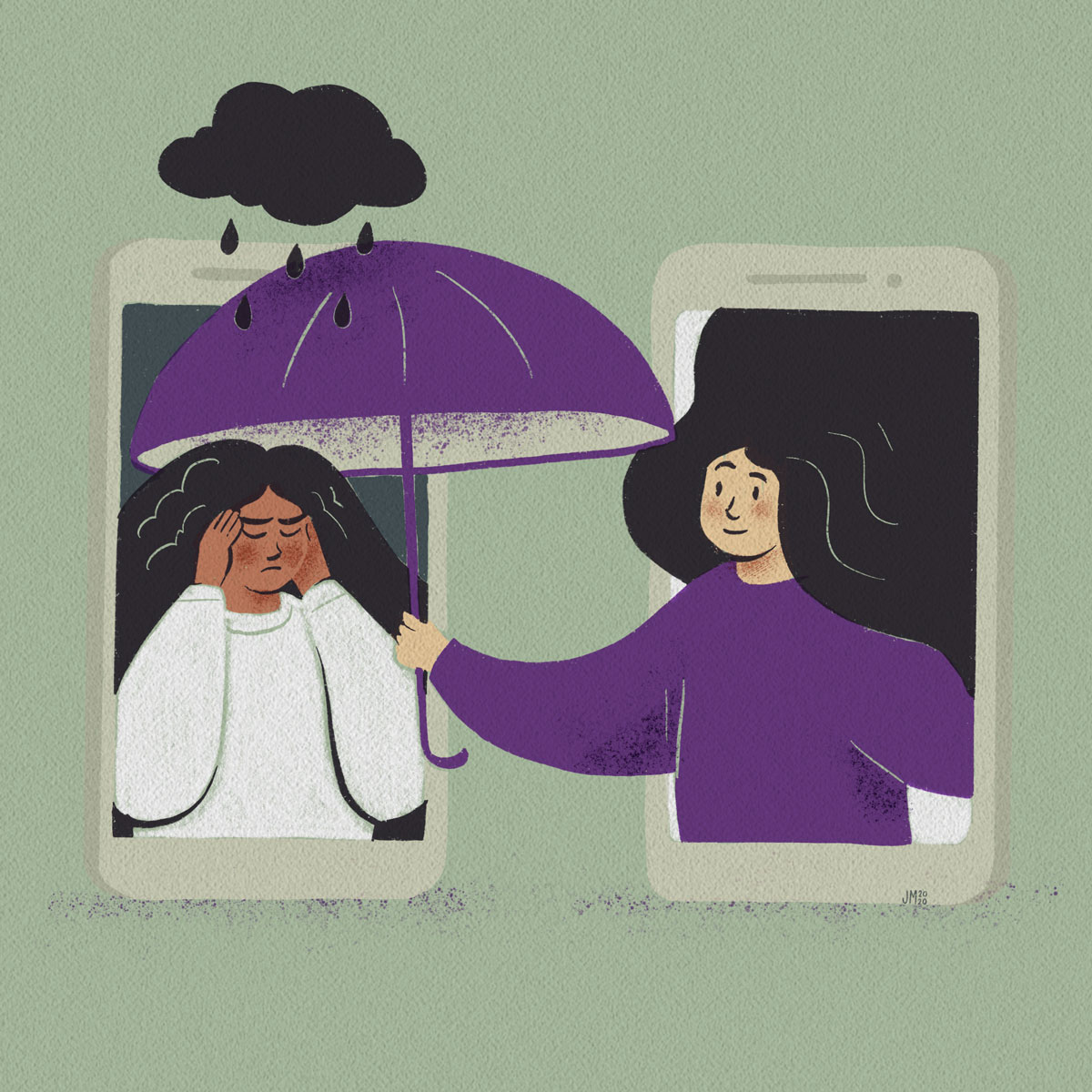If you or someone you know needs help, trained and caring people are ready to support you. Read on for a list of resources to call, text, or chat, and what to expect when you do.
Contacting a support line can feel daunting. You might wonder things like:
- Are my problems serious enough?
- Will they turn me away?
- Is it confidential?
- Will I get a person or a recording?
- Will they understand my specific issues?
The bottom line is that your feelings aren’t trivial, and no one will ever make you feel bad for seeking help. If the person you reach can’t help with your specific needs, they’ll point you to other resources that can.
Read on for more information about who to contact and what to expect.

If you or someone you know is in crisis right now, call or text 988 to reach the Suicide and Crisis Lifeline. If someone’s life is in immediate danger, call 911.
988 Suicide and Crisis Lifeline
Call or Text 988
Chat 988lifeline.org/chat
Formerly the National Suicide Prevention Lifeline
Hours: 24/7
Who 988 is for:
- Anyone experiencing any kind of emotional distress. This includes suicidal thoughts, substance abuse, mental health crisis, depression, loneliness, anxiety—basically, anything related to mental health.
- Anyone concerned about a person they know who might need crisis support.
What it’s like to call 988:
- You’ll first hear a greeting message while your call is routed to the Lifeline network crisis center within your area code.
- A trained counselor answers the call, listens to you, provides support, and shares resources if needed.
- If the local crisis center can’t take your call, you’re automatically routed to a national backup crisis center.
- The Lifeline provides live phone services in English and Spanish and uses Language Line Solutions to provide translation services in over 250 additional languages.
What it’s like to text 988:
- A trained counselor will answer your text,
- They may or may not be local.
- Currently, texting is available in English only.
What it’s like to web chat 988:
- You’ll be asked to fill out a short survey to identify your main area of concern and tell your counselor a little about you and how you’re feeling. The information you share is confidential and encrypted. In fact, your 988 chats are secured with the same data protection standards that banks use.
- A counselor will answer your chat as soon as one is available. If there’s a long wait, you’ll get a message letting you know. You may call 988 to speak to someone right away.
- The busiest times for chat are between 10 PM and 2 AM EST.
Hotlines specifically for kids and teens
+ YouthLine
Text teen2teen to 839863
Call 1-877-968-8491
- YouthLine is a safe space for children and adults ages 11-21 to talk through any issues they’re facing.
- You can talk about things like relationship or family issues, eating disorders, sexual identity, bullying, depression, self-harm, suicidal thoughts, anxiety or anything that’s bothering you.
+ Childhelp National Child Abuse Hotline
Call or Text 1-800-422-4453
Chat: childhelphotline.org
Contact Childhelp for issues related to child abuse. A trained counselor will support you and provide information on how to get help with your situation.
Childhelp’s website provides lots of useful information and resources for teens. They provide answers to questions like:
- Who do I report child abuse to?
- How do I know if I’m being emotionally abused?
- What will happen if I run away?
- When can I be emancipated?
- Will my parents go to jail?
Childhelp also provides resources for parents regarding how to prevent abuse and how to support a child who’s been abused.
Domestic Violence and Sexual Assault
+ National Domestic Violence Hotline
All communication is available in English and Spanish
Call 1-800-799-7233
TTY 1-800-787-3224 (for deaf or hard of hearing)
Text START to 88788
Chat thehotline.org/get-help
While every contact is unique, advocates from this organization will emphasize these points during your conversation:
- Are you in a safe place to talk?
- How are you taking care of yourself?
- Why don’t you tell me about your situation?
- What have you considered so far?
- Let’s brainstorm together.
- What else is on your mind?
+ National Sexual Assault Hotline
RAINN (Rape, Abuse & Incest National Network)
All communication is available in English and Spanish
Call 1-800-656-4673
Chat here
Receive support, information, advice and/or a referral from a trained support specialist.
The Online Hotline takes several steps to keep your information safe and secure, including encrypting all of your chat messages.
Hotlines for the LGBTQIA+ community
There are several options for people in this community.
Crisis Care and/or Supportive Conversation
If you need support during a crisis or just a safe space to talk about whatever is bothering you, The Trevor Project and the Trans Lifeline can help.
+ The Trevor Project (for kids and teens)
Call 1-866-488-7386
Text START to 678678
Chat thetrevorproject.org
The Trevor Project offers a safe space for LGBTQIA+ young people to get information, resources and support. You can call, text or chat with a trained counselor 24/7 whether you’re thinking about suicide, feeling lonely, or in need of support.
+ Trans Lifeline
Call 1-877-565-8860
This is a peer support line run by trans people for trans and gender questioning people.
You may call this line if you need to talk to a trans person, even if you’re not in crisis or not sure you’re trans.
If you’re supporting a trans loved one in crisis, call the main hotline and they will transfer you to a Family & Friends Line operator. This operator may be cis or trans and will have experience supporting trans people, including those in crisis.
Peer Support Lines
If you’re not in crisis and need supportive conversation, the LGBT National Help Center lines can help.
+ LGBT National Help Center
Main Hotline: 1-888-843-4564
Youth Talkline: 1-800-246-7743
Senior Hotline: 1-888-234-7243
Email: [email protected]
Hours
Monday – Friday: 4PM to 12AM EST
Saturday: 12PM to 5PM EST
This organization provides a safe place for you to talk about whatever is troubling you with a peer support volunteer. These volunteers identify somewhere on the LGBTQ spectrum and come from all over the US.
Calls are confidential and anonymous. They won’t call authorities, 911 or rescue services on your behalf, though they will provide you with phone numbers to call for yourself.
Warmlines
Whatever your specific needs are, if you feel distressed and want to have a conversation with a trained peer, contact a warmline. Warmlines are staffed by people who’ve been through their own mental health struggles and know what it’s like to need help.
What to expect from a warmline
When you call, text or chat on a warmline, a trained peer will listen to you and provide emotional support. They may also help you identify skills and strategies to cope with your current situation. If you need crisis services or more formal treatment, they can direct you to resources and help you mentally prepare for the next steps.
List of warmlines
Mental Health America keeps an up-to-date list of warmlines by state. Some warmlines provide national support, while others service people in a specific state or county.
Examples of warmline contact
Mental Health America of Virginia provides these examples of people who’ve called their warmlines and the kind of support they’ve received:
- A person texts and calls the warmline regularly to get support when she experiences hallucinations and voices that disturb her. She shares her experiences and uses her time to identify coping skills that help her when these experiences arise. She frequently expresses gratitude for the support she receives.
- A new caller reported having difficulty feeling motivated to complete daily activities, including going to work. She began using the line to “check in” and receive ongoing support, set goals, identify self-care tools, and learn about resources available to her. The caller was reluctant to use the local treatment system due to her professional role in the community.
- A regular adult caller who lives with his guardian parents calls when he gets angry with his mom when she tells him to do something that he doesn’t want to do. After connecting with a peer recovery specialist, he can identify healthy strategies to release anger, like going for a walk and expressing how he feels to his mom. Feeling empowered to make his own decisions about how to respond improves his mood.
Next Steps
If you or a loved one needs mental health support, it’s important to reach out and get help. Don’t wait until things get worse. Contact one of the support lines listed above, call your doctor, or contact Athena Care for mental health services in Tennessee.
For mental health care in Tennessee, contact Athena Care.
One of our friendly associates will help you get the services you need. Take this first step to feel better and take control.

Rachel Swan, MS
Editor
Rachel has a Masters of Science in Clinical Psychology from Vanderbilt University, where she spent 16 years as a Research Analyst in the Psychology and Human Development Department.


